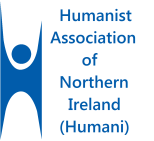Marcus Brooks and Joni Spence commented on the report of the 19 June meeting discussion on the HAI EGM and the problem with their Celebrants being made state Solemnisers. Many visitors to our website would like to understand what this is about.
The criticism of the Humanist Association of Ireland (HAI) for accepting its Celebrants being legal Solemnisers of state marriages, under the Civil Registration Amendment Act 2012, is not that the HAI should not provide marriage and civil partnership ceremonies that are also the legal bond, but that accepting this generally admirable plan under this particular law will inhibit the HAI from secular campaigning. And Ireland needs a national body that will campaign vigorously (not weakly) for a secular state and a secular society.
Mid West Humanists’ views on secular marriages
People who have come to the Mid West Humanists’ (MWH) meetings have talked of secular marriage ceremonies many times. The commonest view has been about people who want a marriage, wanting to have the ceremony free of any religious matter. I think people who spoke also wanted not to be involved in the hypocrisy of using a church organisation for their wedding when they do not believe in a god, and have not and will not be attending the church for years before and after the marriage. People also wanted not to show hypocrisy by marrying in a church when they say to their relatives and friends that they have no religion. Some people who have come to MWH meetings have talked of the difficulty in getting people to believe that you do not have a religion.
In 2011 several meetings discussed whether we could do something to have the HSE improve the decor of the Registry Office in St Camillus’ Hospital Limerick, to a standard that two people and their few guests would feel good enough for the ceremony of a major new stage of their lives. We didn’t get around to doing anything.
New attenders and visitors to the website often ask how to contact a humanist celebrant, and we always give a contact for the Celebrants of the Humanist Association of Ireland. There is a link to this in the left sidebar.
I’ve never heard anyone speak in favour of having two procedures or events: but I can see a person wanting to have the legal start of his or her marriage being like any other formal signing of a contract, and thus being free to have the party run in any way they like – this person might want to have two events.
Humanist Association of Ireland and Marriages
The question within the Humanist Association of Ireland is not about the State registering marriages with the officiant or solemniser having no connection to a religion. Up to 2012 the only non-religious officiants have been the State’s registrars. Many Mid West Humanists (and others) were happy with this, and the limits were about the poor decor in the Limerick office (and elsewhere, I would suspect), and how the Registrar worked only on weekdays and it was quite hard to get the Registrar to officiate at places outside the Office. Many other people wanted the type of ceremony that the Humanist Celebrants organise, and saw no good reason to have to go to the Registry Office as well.
The people within the Humanist Association of Ireland (HAI), and people who attend the Mid West Humanists, who see difficulty with the HAI and the Civil Registration Amendment Act 2012 (CRAA), have never spoken against pairs of people (who plan to marry or be civil partners) getting to have only one ceremony and it having no religious content. All the critics of the HAI’s stance see this aim as entirely reasonable.
I am not a member of the HAI Reform Group but I have communicated a lot with them, and I spoke in favour of their motions at the Extraordinary General Meeting (EGM) on 26 June 2013. The HAI Reform Group are a set of members of the HAI who think that accepting appointing solemnisers of marriages under this particular law will cause trouble to the HAI and to the promotion of humanist and secular aims. (They see some other problems within the HAI also).
Problems for the HAI in the Civil Registration Amendment Act
In the CRAA 2012, Section 3.” Secular Body 45A (2) (b) you may read that the Secular Body, which this law allows to nominate Solemnisers of marriages, must not promote a political cause. Now 45A (2) (a) states that such a body cannot be a political party, so a political cause does not mean being a political party but must be some political promotion less than being a party.
The HAI, like people who attend MWH, promote the political cause of getting the State’s constitution, laws, and administrative practices changed to being entirely secular, not biased towards religious organisations or people who have religion (rather than no religion), and that they be quite indifferent to the matter of whether a citizen or resident or visitor has a religion or not. The HAI have a page on Campaigns; they have more detail in Equality for the Non-Religious.
The HAI Reform Group drew attention to how the State department that administers the CRAA 2012 – the Department of Social Protection – should by the text of the Act object to the HAI campaigning to the government to have the state institutions made secular and administered without discrimination, or to campaigning to the government on any other matter.
From their statements in email and print newsletters to the HAI members, the HAI Board of Directors (except director Kevin Sheehan) believe that it is wisest to work with the CRAA 2012. To do this they have said that the HAI does not promote a political cause, though it does promote a social cause. All but one of the directors have told the members that they think that the section prohibiting promoting a political cause will not stop the HAI from public campaigning as it has done since it was founded in 1993.
The HAI Reform Group and other critics think that that is a mistake. At the EGM on 26 June 2013 HAI director Brian Whiteside (Co-ordinator of Ceremonies) told the members present that in December 2012 the HAI board tried to find out from the government what the “political cause” meant, and they could not get an answer. Brian said that he then wrote to the Department of Social Protection that the HAI does not promote a political cause but does promote a social cause.
At his turn to speak Michael Nugent said that this was not being honest to the government, and he thought this a poor standard of ethics for the HAI (whose website states that humanism is ethical) and so poor for the reputation of the HAI.
At my turn to speak I said that, while at the start perhaps no government agency will either remind the HAI not to make political campaigns nor remove the recognition of their Celebrants as legal Solemnisers, the HAI board and other active members may quietly and unconsciously campaign to the state in a somewhat weaker manner than they might otherwise do. I said that the effect of accepting solemnisers under the CRAA 2012 may be that the HAI without any awareness gradually becomes much less effective at campaigning for a secular state and society.
Outcome of the Extraordinary General Meeting of the HAI 26 June 2013
There were about 120 HAI members present. About 30 voted for the motions to stop the HAI board keeping its Celebrants registered as State Solemnisers and to tell it to try to re-negotiate the law. About 90 voted against these motions.
Conclusion
So the criticism of the HAI for accepting its Celebrants being legal Solemnisers of state marriages, under the Civil Registration Amendment Act 2012, is not that the HAI should not provide marriage and civil partnership ceremonies that are also the legal bond, but that accepting this generally admirable plan under this particular law will inhibit the HAI from secular campaigning. And Ireland needs a national body that will campaign vigorously (not weakly) for a secular state and a secular society. And I worry that the strength of its campaigning will be weakened.
Filed under: constitution, debate, ethical issues, humanism, ireland, Meetings, morality, political issues, social issues | Tagged: constitution of ireland, equal rights, Human Rights, humanism, ireland, law, marriage, organisation, politics, society |








































Leave a comment